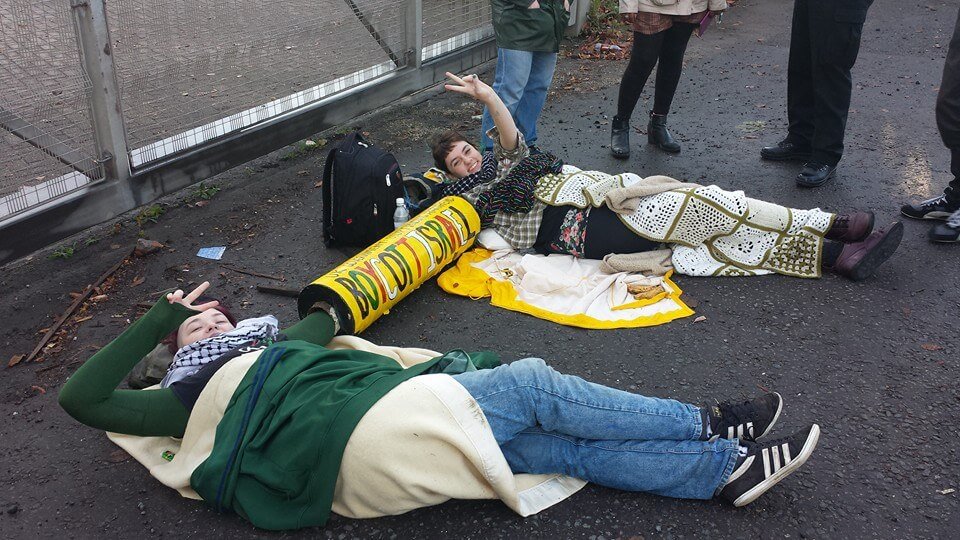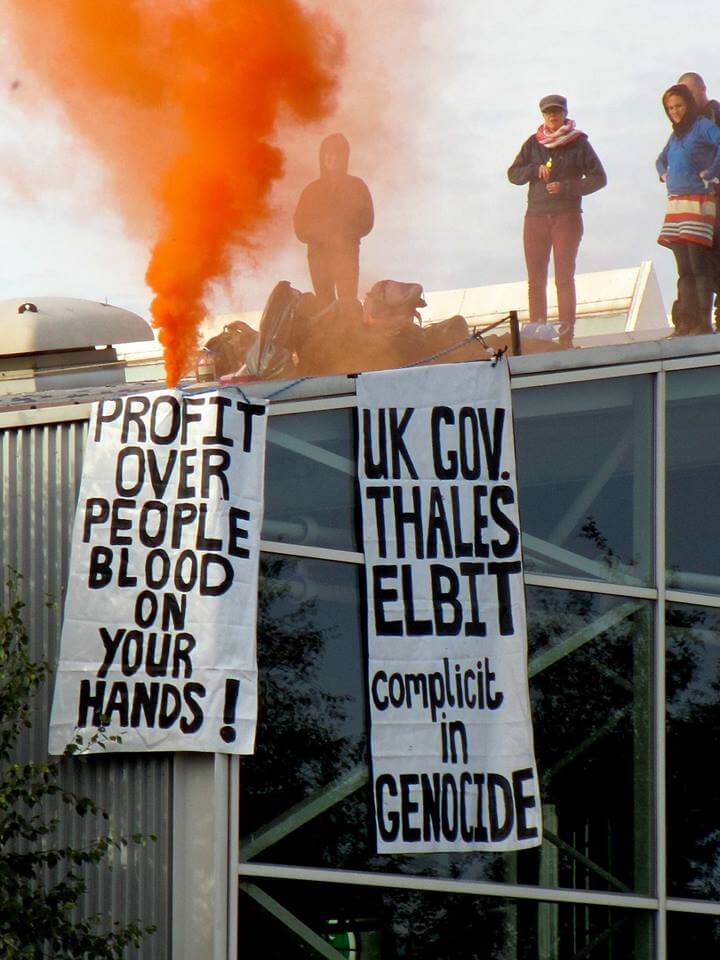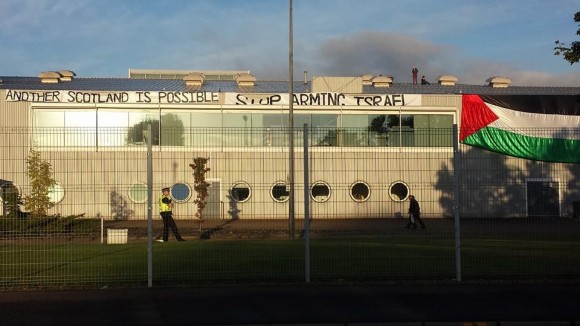After a gruelling fourteen day trial, a group of activists known as the Thales Ten,* received their verdict in Glasgow Sheriff Court last week. Five were convicted, and five acquitted, of the crime of breach of the peace.
The group scaled onto the roof and blockaded entrances to the Thales UK factory on 23rd September, 2014 in response to the war in Gaza. They hung a fifty foot Palestine flag and several banners. One read: ‘Another Scotland is Possible: Stop Arming Israel’. Another made the connection between the French arms company Thales, Israel’s Elbit Systems, and the UK Ministry of Defence.

The UK Government and the French and Israeli arms giants are cooperating over the delivery of the next generation of Watchkeeper drones. This evolution in unmanned aerial warfare will replace the Hermes drone, which has been used to deadly effect all over the world, notably in Afghanistan, Pakistan, Yemen and Palestine. A common sight over the skies of the Gaza Strip, drones are frequently used by the Israeli occupation forces to survey and launch deadly attacks against Palestinians. Human Rights Watch documented 87 killings through drone strikes on the Gaza Strip during the Israeli named ‘Operation Cast Lead’ in 2008-9.
In a major victory for Palestine activists against the arms industry, a member of Thales senior management was summoned by the Scottish courts to answer questions as to the nature of their business. Activists cross-examined a Senior Manager of Thales UK, Ian Lindsay, in their defence. Mr Lindsay admitted that components manufactured on the Clyde in Glasgow are used in military drones.
Glasgow Palestine Action: “We have established that the UK Government are in cooperation with Thales and Elbit who are the largest arms manufacturer in Israel and are producing the next generation of Watchkeeper drones and we also established that components for that project are produced in Glasgow – is that correct?”
Mr Lindsay (Thales) “For Watchkeeper, yes.”
Glasgow Palestine Action: “So when you said we were labouring under the misapprehension that components for drones were made at the Glasgow site was that incorrect?”
Mr Lindsay (Thales): “I said you were labouring under the misapprehension that munitions were made at the plant.”
Glasgow Palestine Action: “But you do manufacturer components for drones at the plant in Glasgow?”
Mr Lindsay (Thales): “We do.”
This is a major admission for a number of reasons. The local community regard Thales as highly secretive as to what is manufactured in the plant. This is significant because in addition to a long history of weaponry and munitions manufactured on the Clyde, there is also a history of resistance. In 1974, Scottish workers at Rolls Royce plant in East Kilbride refused to service engines bound for Pinochet’s coup of Salvador Allende. An act that later saw Bob Fulton, John Keenan and Robert Somerville awarded the highest honour by the Chilean Government.
It is also significant because it is rare that arms companies are called to face the courts as to the nature and legality of their business. In August, 2014, nine Palestine activists shut down a subsidiary, Elbit, UAV Engines Ltd. in Shenstone, England. Despite being charged with aggravated trespass, the Crown Prosecution Service dropped the case. It is widely believed that this was due to external pressure to avoid the arms companies being called upon to speak to the nature and legalities of their business.

According to their own trade regulations, the UK is not allowed to sell arms to countries that violate international law. Concerning arms sales, criterion six of the Consolidated EU and National Export Licensing Criteria compels the British government to take into account the buyer’s respect for international law. The United Nations mandated Goldstone Report, investigating the conduct of the belligerents during ‘Operation Cast Lead’, contained damning evidence of Israel’s violations of international law.
In a Ministerial Statement on 21 April 2009, then Foreign and Commonwealth Secretary David Miliband admitted that Israeli equipment used in Gaza in the 2008-9 conflict “almost certainly” contained UK-supplied components. One of the ways the UK government circumnavigates its own trade restrictions on arms is by selling components of weapons to be assembled into deadly weapons in other countries.
It is believed that the CPS dropped the Shenstone case is because activists were arrested for aggravated trespass, a charge which is based on the disruption of “lawful activity”. Had the case gone to trial, the nature legality of UAV Engines’s business would have been put under the microscope in a court of law. Something the British Government has a clear interest in preventing.
In the case of the Thales Ten, activists could not probe the legality of Thales business. The alleged crime was the breach of the peace (which does not exist in England): the only requirement for a conviction is the probability that fear and alarm could be caused to an individual, or that a serious community disturbance is likely. Delving into the legality of Thales business was deemed irrelevant to the case. However, activists were able to establish a clear link in court between Thales, Elbit Systems and the MOD, and also drone components manufactured in Scotland, and alleged war crimes in Gaza.
After the conclusion of the case, Glasgow Palestine Action vowed to keep up the pressure on Thales and other arms manufacturers in Scotland. A member of the group, Frida Grey said:
“Today was a major victory for Palestine activism in Scotland. We hauled Thales into court. We made them admit that they manufacture components of drones on the Clyde, and we confronted them with the devastating consequences of their business, in Gaza, and all over the world. There has never been a better time for us to push for an arms embargo on Israel, and boycott, divestment and sanctions against all companies which seek to profit from the devastation meted out on the people of Palestine.”
After the last Gaza war, Scottish Minister for External Affairs, Humza Yousaf, called on an arms embargo on Israel:
“The Scottish Government has demonstrated that we cannot stand idly by while innocent civilians are being killed. I am today, on behalf of the Scottish Government, calling for an immediate suspension of arms sales to Israel.”
The arms industry in Israel and its connection to Western economies is a major driver and sustaining force in the occupation, colonial and apartheid conditions in Palestine. The question for activists in Scotland (and across the UK) is given the Scottish Government’s stance regarding an arms embargo on Israel, is how can this be progressively exploited? Under the Scotland Act, trade is devolved to Westminster, however, with the political climate so charged for change, what more can be achieved towards justice for Palestine?
* The Thales Ten are members of Glasgow Palestine Action, a women, queer and trans*-led group, organizing and taking action against Israeli apartheid through boycott, divestment, sanctions, and other solidarity work.



This is fascinating stuff:
If we have similar laws in the US, I hope they are used as much as they can be used. Probably not, but it’s a nice thought.
Thanks so much for your efforts and for explaining your legal leverage/strategy. Brilliant.
Thank you to the Thales Ten. Hurrah!
Wonderful success coupled with continued tenacious and relentless determination~ you’re awesome.
Thank you, Glasgow Palestine Action.
“According to their own trade regulations, the UK is not allowed to sell arms to countries that violate international law. Concerning arms sales…”
Many Western countries are violating laws wrt to arming Israel, supporting the Occupation, and their regional aggression.
Good for them .Who says you can,t fight city hall.
“Some of the world’s leading high-tech companies have reportedly signed a petition calling for direct flights between Tel Aviv and Dublin, the capital of Ireland, according to the website of the Irish Independent newspaper.
“Direct flights would encourage more collaboration between tech companies to join forces and target customers in bigger economies, such as the U.S. and China,” said Clyde Hutchinson, CEO of the Ireland-Israel Business Network, which is sponsoring the petition.
Linkedin, Facebook, Intel, eBay and Salesforce are among the companies that have signed the petition, Hutchinson said. The European headquarters of many of the world’s tech giants are located in Dublin.
Currently, travellers from Tel Aviv must catch a five-hour flight to London followed by a separate connection to Dublin. A direct route would reduce travel time to just over five hours.
In addition, Dublin has United States pre-clearance facilities, meaning that travelers can pass through U.S. customs in Dublin, a boon for the travelling businessperson.
“Many multinationals have their Israeli desks based in Dublin, so not having a direct flight is a huge inconvenience,” said Hutchinson.
“Executives and workers of these companies are constantly moving back and forth …”
Hutchinson estimated that a Dublin-Tel Aviv route would cater to some 40,000 annually, a number that would require additional connecting flights between Dublin and North America.
“Tel Aviv is the second largest startup ecosystem in the world, yet is not connected to the number one ecosystem, Silicon Valley, by a direct flight,” said Hutchinson. “Ireland’s unique connectivity with the US and the ability to clear US customs is a huge selling point for entrepreneurs.”
read more: http://www.haaretz.com/beta/1.669961?utm_source=dlvr.it&utm_medium=twitter
Hmmm. Wonder if Ireland proper will cave to “Clyde Hutchinson, CEO of the Ireland-Israel Business Network”.
“Potent images of Palestine’s struggle to be shown at major Scottish festival …
The photographs have been taken by Hamde Abu Rahma from Bilin, a West Bank village surrounded by Israel’s apartheid wall. He has been documenting the Palestinian struggle since Israeli soldiers killed his cousin Bassem during a 2009 protest.
As part of a project called Welcome to the Fringe, a full day (23 August) will be devoted to Palestinian art during the Scottish festival.
The day’s performances will include a new play, Shakespeare’s Sisters, from Al-Harah Theater, which is based in Beit Jala, near Bethlehem.
Among the other artists on the program are traditional storyteller Fida Ataya, dancers Farah Saleh and Yazan Ewidat, comedian Ayman Nahas, poet Alice Youssef and musicians The Shagaf Ensemble.
Welcome to the Fringe is the brainchild of Scottish playwright David Greig.
He was one of the many Scottish artists who supported a 2014 campaign which succeeded in pressuring Israeli state-funded performances to quit the festival.
Greig has said that he felt “Palestinian voices were absent from Edinburgh. I could hear Palestinians being talked about and around and over but I couldn’t hear directly from them.”…”
https://electronicintifada.net/blogs/sarah-irving/potent-images-palestines-struggle-be-shown-major-scottish-festival